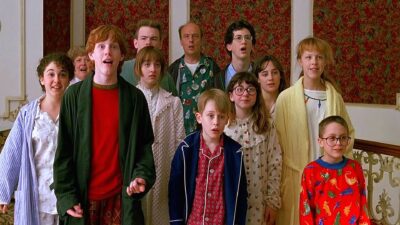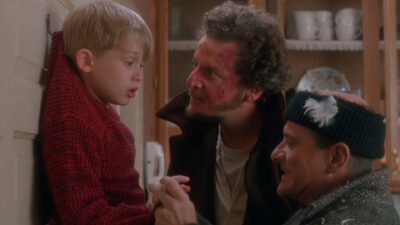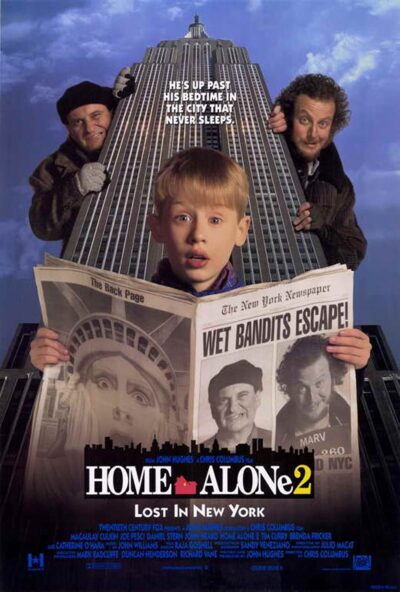 One of the more inexplicable cultural touchstones of our era is 1990’s HOME ALONE. It’s something that can’t be dismissed as a product of its time, as the film is extremely highly revered today, and nor can that current vogue be put down to modern sensibilities, as, speaking as one who worked in a movie theater in 1990, I can attest that HOME ALONE was quite the smash back then—indeed, far and away the most popular movie that showed during my movie theater usher tenure, from its sold out sneak preview screening onward.
One of the more inexplicable cultural touchstones of our era is 1990’s HOME ALONE. It’s something that can’t be dismissed as a product of its time, as the film is extremely highly revered today, and nor can that current vogue be put down to modern sensibilities, as, speaking as one who worked in a movie theater in 1990, I can attest that HOME ALONE was quite the smash back then—indeed, far and away the most popular movie that showed during my movie theater usher tenure, from its sold out sneak preview screening onward.
The film’s beginnings were inauspicious. It was a product of the late John Hughes, who by 1990 was an industry unto himself. He’d become proficient enough at screenwriting that he was able to crank out a script in a few days, which would appear to have been the case with HOME ALONE (whose similarities to the 1989 French thriller GAME OVER were, I’m assuming, incidental). It was intended as a vehicle for the young Macaulay Culkin, who had impressed Hughes in his co-starring role in UNCLE BUCK (as he had Adrien Lyne, who after directing Culkin in JACOB’S LADDER called him the most gifted child actor he’d ever worked with). The project was sold to Warner Bros. (who put it into turnaround) and then Twentieth Century Fox executives as a “nice movie,” budgeted at an economical (by mainstream Hollywood standards) $15 million.
The director was Chris Columbus, hired because of his helming of the very John Hughsian ADVENTURES IN BABYSITTING (1987). It was the Christmas-obsessed Columbus who took what is said to be a very raucous script and gave it the sappy Yuletide-flavored makeover. that it seems has enchanted viewers around the world.
Mac plays Kevin McCallister, the world’s most resourceful 9-year-old. He, his brothers, sisters and uber-rich parents (John Heard and Catherine O’Hara) live in a massive house in the Chicago suburbs. John Hughes once made movies about poor people (remember PRETTY IN PINK and SOME KIND OF WONDERFUL), but his heart was clearly with the one percent (let’s not forget Mr. Ferris Bueller, whose one and only major problem was that his parents didn’t get him a car for Christmas). This tendency, however, worked in HOME ALONE’S favor audience-wise, as it provided a wish-fulfillment angle to go with the silliness; the failure of the Hughes-Culkin RICHIE RICH in 1994 can be partly blamed on the fact that, in essence, they’d already made it in the form of HOME ALONE.
Kevin and his family are introduced in an extended opening sequence that’s plain bad, with Hughes setting up a plethora of plot contrivances. Kevin, on the eve of a family trip to Paris for Christmas, gets harassed by his older brother Buzz (Devin Ratray) and Uncle Frank (Gerry Bamman), and so wishes for his family to disappear. He’s forced to sleep in the attic (by himself because his cousin, played by Mac’s brother Kieran Culkin, is a bedwetter), and so is overlooked the following morning, when the family heads off to the airport after a downed branch causes a power outage, and a bratty neighbor kid is counted in Kevin’s place (another plot point, involving Kevin’s inability to pack a suitcase, is quickly dropped).
contrivances. Kevin, on the eve of a family trip to Paris for Christmas, gets harassed by his older brother Buzz (Devin Ratray) and Uncle Frank (Gerry Bamman), and so wishes for his family to disappear. He’s forced to sleep in the attic (by himself because his cousin, played by Mac’s brother Kieran Culkin, is a bedwetter), and so is overlooked the following morning, when the family heads off to the airport after a downed branch causes a power outage, and a bratty neighbor kid is counted in Kevin’s place (another plot point, involving Kevin’s inability to pack a suitcase, is quickly dropped).
I’m not sure I’d call what Macaulay Culkin does here “acting.” He’s charismatic, certainly, and enormously fun to watch, being prone to exaggerated facial expressions (it’s certainly no accident that the film’s most iconic image is of Mr. Culkin making a face) and very aware of the camera. He is, in short, the quintessential child performer, which explains why Culkin has never been able to maintain a grown-up acting career (although I’ve heard good things about his performance in 2003’s PARTY MONSTER).
But anyhow: Kevin finds himself alone in his house while his family flies to Paris, where upon landing they confront a Parisian flight attendant (played by the very American Hope Davis). Kevin’s mom (Catherine O’Hara, who’s admittedly quite good) desperately tries to get back home while two dumb-assed crooks (Daniel Stern and a just-coming-off-GOODFELLAS Joe Pesci) stake out Kevin’s house, and he finds various clever ways to hold them off. Eventually Kevin learns they plan to make a full-fledged Christmas Eve siege at 9PM, and vows “I’ll be ready!” Thus begins the film’s raison d’etre: an extended ballet of violence, inspired by STRAW DOGS, that has gone on to far outpace its inspiration in popularity (a frequent criticism of the 2011 STRAW DOGS remake was that it “ripped off” HOME ALONE).
 As I recall, the hysterical audience laughter during the siege sequence, beginning with Pesci and Stern taunting Kevin from the back door of his house to the two being taken away in handcuffs (somehow Kevin is able predict exactly where the bad guys will be at every moment, and booby trap his house accordingly), was like nothing else I’ve ever experienced in a movie theater before or since. Included in the sadism is a shot to the nuts with a BB gun, a tumble down some icy steps, a head burned with a blowtorch, a face smashed with an iron, an upturned nail stuck through a bare foot, heads bonked with paint cans and shovels, and a tarantula affixed to a face. As Columbus exclaimed, “Part of the vision of HOME ALONE was to make absolutely certain that the stunts felt painful.” Those stunts, furthermore, were quite iconic, with certain movie pratfalls now termed “a HOME ALONE” in the stunt world.
As I recall, the hysterical audience laughter during the siege sequence, beginning with Pesci and Stern taunting Kevin from the back door of his house to the two being taken away in handcuffs (somehow Kevin is able predict exactly where the bad guys will be at every moment, and booby trap his house accordingly), was like nothing else I’ve ever experienced in a movie theater before or since. Included in the sadism is a shot to the nuts with a BB gun, a tumble down some icy steps, a head burned with a blowtorch, a face smashed with an iron, an upturned nail stuck through a bare foot, heads bonked with paint cans and shovels, and a tarantula affixed to a face. As Columbus exclaimed, “Part of the vision of HOME ALONE was to make absolutely certain that the stunts felt painful.” Those stunts, furthermore, were quite iconic, with certain movie pratfalls now termed “a HOME ALONE” in the stunt world.
All this was scored, surprisingly, by John Williams, who reportedly “loved” the rough cut. Williams’ music is catchy, but (as tends to be the case with his scores) also a mite bombastic and overdone. If it’s true that movie music serves as punctuation then Williams’ HOME ALONE score would consist primarily of exclamation points.
Yet the film was a monster hit, serving, it seemed, as the unlikely feel-good cinematic panacea of its time. As a VARIETY headline, referencing the January 1991 invasion of Kuwait, proclaimed: “Audiences Find Comfort At ‘Home.’” It ended its run with a gross of $285 million dollars, making it, for a time, the second or third top-grossing movie ever. It may have since lost that designation, but modern audiences react to HOME ALONE that same way viewers did thirty years ago.
Regarding the more expensive HOME ALONE 2: LOST IN NEW YORK, rushed into production and released in November 1992, little need be said. Hughes and Columbus once again served as writer and director, respectively, and virtually the entire cast returned, including Pesci and Stern. Those two somehow end up in NYC along with Kevin, who gets waylaid in another family vacation (this time to Miami) gone wrong, using his parents’ credit cards to stay at the Plaza Hotel (necessitating a cameo by the Plaza’s owner, one Donald J. Trump).
As you might expect, the movie shamelessly replicates HOME ALONE’s every beat, including the siege climax, which takes place in a vacant townhouse, and is even more sadistic and implausible than that of its predecessor. There’s really no point going into particulars, although the film does contain one magical element: Tim Curry as a hotel concierge, who’s hilarious throughout, particularly in a roll-on-the-floor bit in which he’s threatened by a dude on a TV screen (perhaps HOME ALONE 2 was among the films Curry referred to in a widely quoted early nineties complaint about giving his all in “stinkers”).
For HOME ALONE 3, scripted by Mr. Hughes and directed by Raja Gosnell (the first two films’ editor), Mac and his castmates exited, with a kid named Alex (Alex D. Lind) and a new set of bad guys taking the stage. The story involves some kind of military transmitter that ends up in the hands of Alex. He isn’t left alone by his vacationing parents, being confined to his house by chicken pocks, so the situation is less dramatic. The most important part—the siege—lasts over an hour, with a mouse trap, electrocution and trap doors among the new-to-this-movie elements.
More sequels followed, though not on the big screen (and not affiliated with John Hughes or Chris Columbus). It seems that with HOME ALONE 20th Century Fox went the REVENGE OF THE NERDS franchise route by following its first two—in this case three—films with a string of crappy made-for-TV sequels. Then again, though, that’s perhaps not such a terrible thing, as many of us believe HOME ALONE was and is best suited to the small screen.
